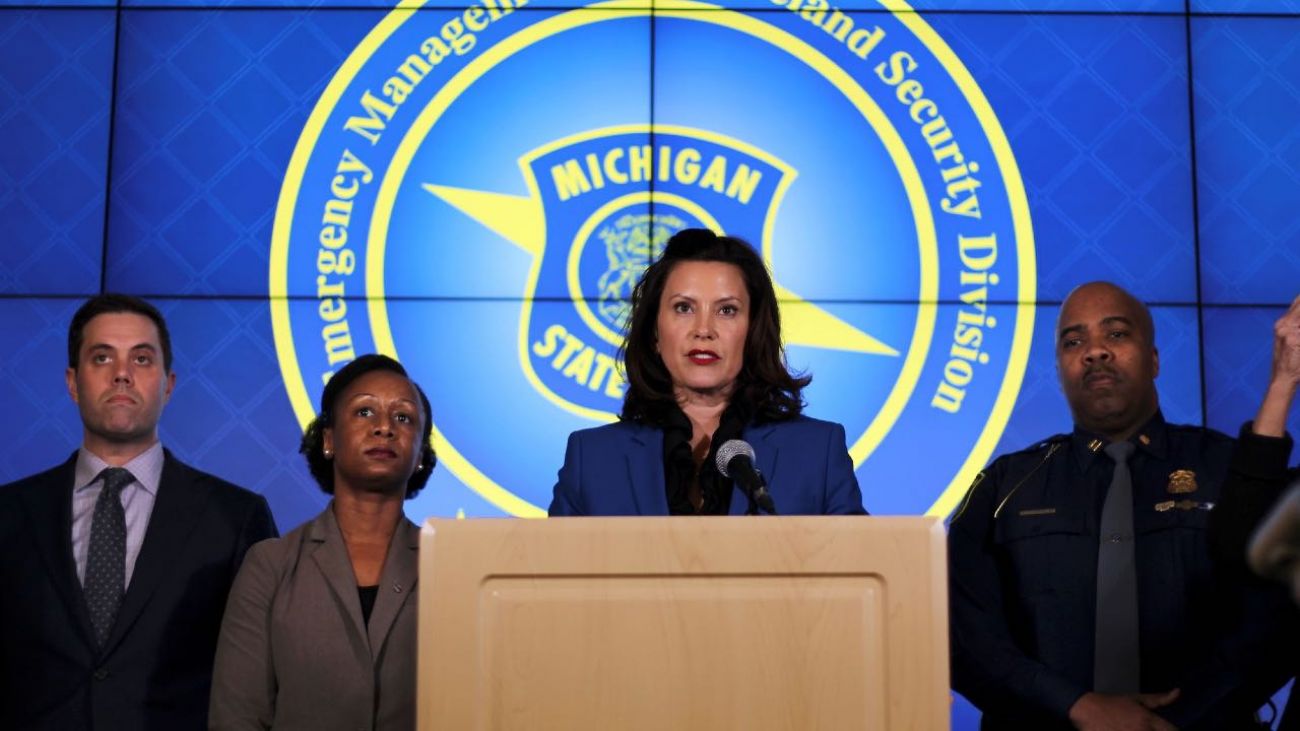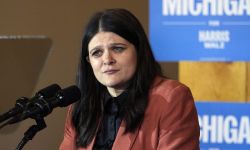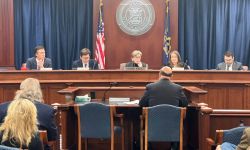Michigan governor, GOP leader inflate the rhetoric in coronavirus fight

Related: Michigan Gov. Whitmer: Trump ‘determined to sow the seeds of hatred’
Did you hear how Michigan’s rural hospitals are at capacity with coronavirus patients? Or that the state is likely to stay under an emergency declaration into 2021? Or that Republicans believe it’s “mission accomplished” on the deadly virus?
So has Bridge Magazine. And it’s all misleading or untrue.
Nuance has become another casualty of the coronavirus, as political fault lines deepen over the handling of the pandemic and Gov. Gretchen Whitmer’s restrictions to slow its spread.
In the past few weeks, elected officials, those who speak for them and partisan voices have made misstatements that inflame already heightened passions. And while some errors are inevitable in a fast-moving pandemic, the statements often have a way of confirming biases and taking on lives of their own.
- The latest: Michigan coronavirus map, curve, chart, updated COVID-19 news
- Gov. Whitmer extends Michigan coronavirus stay-at-home order to May 28
- Whitmer reopens Michigan from coronavirus in phases: What that means to you
But could the misstatements hurt the governor, Republican leaders or others during an outbreak that has killed more than 4,500 Michiganders and sickened 47,000?
“It only hurts if you get caught,” said David Dulio, a political science professor at Oakland University.
Here’s a look at a few assertions in the past few weeks that, at the very least, deserve some explanations.
Claim #1: “Many of the hospitals in our rural areas actually are at capacity.”
Source: Dr. Joneigh Khaldun, Michigan’s chief medical executive, on May 3 on NBC’s Meet the Press.
Truth: No hospital in Michigan, rural or otherwise, was at capacity when she said it, nor are any now, according to available state records.
In a May 11 update of hospital census data, the Detroit Medical Center had the highest occupancy, at 79 percent. Ascension health care system, which has both rural and urban hospitals, was at 63 percent, though the numbers are not broken down by individual hospitals.
Ascension's rural hospitals in Tawas City and Standish, just north of Bay City, are in a region that has reported 63 percent bed occupancy. That region also includes Genesee and Saginaw counties which had seen higher rates of the virus than other rural areas of Michigan.
Throughout the region that includes those two hospitals, there were 145 COVID-19 inpatients as of May 11.
The rural hospital system with the highest occupancy rate is UP Health, which has three hospitals in the Upper Peninsula. Yet those three are treating just one COVID-19 patient in hospitals that are at 56 percent of capacity on Monday.
More common among rural Michigan hospitals are few to no COVID-19 patients and occupancy rates below 30 percent.
What gives: Bridge asked state officials via email to explain what hospitals Khaldun was referencing. On May 5, a spokeswoman said they would look into it but she did not subsequently provide an explanation.
Claim #2: Khaldun said Michigan “will likely be restricted under Emergency Declarations well into 2021.”
Source: Senate Majority Leader Mike Shirkey, R-Clarklake, mischaracterizing Dr. Khaldun in a May 1 Facebook message he posted criticizing Whitmer’s handling of the crisis.
Truth: Here’s what Khaldun actually said at an April 28 briefing: “We can beat this disease, but it will really be a long-term effort that will likely go well into next year until we have a vaccine, or hopefully an antiviral treatment that works."
She did refer to 2021 (“next year”) but made no reference to emergency declarations. She was stating what almost every public health official has said for weeks: The coronavirus is going to require a change of behavior until there is a cure or a vaccine, which is expected to take a year to 18 months, at the earliest.
What gives: As of May 10, the post remained on Shirkey’s Facebook page. His office did not respond to a request for comment.
Claim #3: The April 15 “Operation Gridlock” protest of Whitmer’s stay-at-home orders at the Michigan Capitol might have sparked COVID-19 outbreaks in rural areas.
Source: The Committee to Protect Medicare (CPM), which pushed out the story on Twitter, wrote: “Cell phone location data shows that after gathering with minimum protection, protesters fanned out to small communities and areas hard-hit by #COVID-19.” Left-of-center media outlets picked up the claim.
Truth: CPM did not produce data to back the claims made in the analysis.
The Committee to Protect Medicare is led by a West Michigan emergency room physician, Rob Davidson, a Democrat who lost a bid for Congress in 2018 and had a run-in with Vice President Mike Pence in Iowa in February.
In making the claim about the protest, Davidson’s group writes that a company called VoteMap “compiled the analysis by identifying smartphone devices seen in the immediate Michigan Capitol area during the day of the protest using advanced mobile geo-location technology.”
Other tech companies offer phone location data and the New York Times and Washington Post have based stories on such analyses. But inferences drawn from those data points were more circumspect — generally limited to making comparisons from one day to the next on the volume of travel activity, rather than identifying particular groups or predicting where future COVID outbreaks would spread.
CPM said the study was based on 300 cellphones in Lansing during the protest and then elsewhere the same day. If the data are accurate, it’s certainly possible some cellphones belonged to protesters, including those who clearly did not observe social distancing or wear a mask at the protest, making them more vulnerable to contracting or spreading the virus.
But the limitations of such data are significant. Even if accurate, all it shows is that 300 cellphones were in Lansing that day and then somewhere else on that same day. It doesn’t compare the volume of mobility that day to any other day, as similar news articles have done. It also would not prove who these phones belonged to. Were all of these cell owners protesters? Could they be legislators? Legislative staff? State employees? Folks going to Lansing for official business?
Claim #4: On April 30, in extending the emergency through executive order, Whitmer wrote that coronavirus “remains present and pervasive” in Michigan, adding that “cases in some counties in western and northern Michigan are now doubling every 6 days or faster.”
True or false? Bridge updates county-level death and case counts on a daily basis. Only one county, Iosco, saw cases double in six days or less in late April, around the time Whitmer wrote the order.
What gives: Bobby Leddy, a spokesman for the governor, pointed to three counties that quickly doubled — Shiawassee, Iosco and Kent.
Iosco did indeed double within six days: from 21 cases on April 23 to 48 cases on April 28. But the two other counties cited took longer: Kent doubled over nine days (626 to 1,479) and Shiawassee over 13 days (86 to 180).
Claim #5: Gov. Whitmer, in an April 30 press release announcing a new executive order, said Republicans had declared “mission accomplished” in the fight against the coronavirus.
Source: Whitmer was reacting to the GOP-controlled Legislature, on a party-line vote April 30, declining to extend her emergency powers.
In a press release and public comments, Whitmer and her communications staff said Republicans have declared “mission accomplished” in the fight against COVID-19 in Michigan. It was an obvious — mocking — reference to a sign behind President George W. Bush in 2003 when he said major operations in the war in Iraq were over. That war would continue for many more years.
House and Senate GOP leaders never declared “mission accomplished” on the virus as they fought Whitmer’s extension of her emergency powers. They have not said the battle was won, or that safeguards were no longer needed in Michigan.
House Speaker Lee Chatfield, R-Levering, has certainly challenged Whitmer’s handling of her emergency powers, arguing for a more regionally based approach. But he has also called the coronavirus an “unprecedented challenge that requires an unprecedented level of partnership.”
Senate Majority Leader Mike Shirkey, R-Clarklake, has certainly had his moments of pique, suggesting at various times that Whitmer was acting like a dictator who was drunk on power during the state emergency. But regarding COVID-19, Shirkey has consistently acknowledged the threat it poses to Michiganders, the enormous battle waged by health care workers and the reality that “life is different and is likely to remain different for some time.”
What gives: When asked for a response, the governor’s spokeswoman, Tiffany Brown, did not explain the basis of the “mission accomplished” talking point. She said “Thousands of people have been killed by COVID-19. The governor’s number one priority is saving lives. She’s making decisions based on science and data, not political or legal pressure.”
See what new members are saying about why they donated to Bridge Michigan:
- “In order for this information to be accurate and unbiased it must be underwritten by its readers, not by special interests.” - Larry S.
- “Not many other media sources report on the topics Bridge does.” - Susan B.
- “Your journalism is outstanding and rare these days.” - Mark S.
If you want to ensure the future of nonpartisan, nonprofit Michigan journalism, please become a member today. You, too, will be asked why you donated and maybe we'll feature your quote next time!




